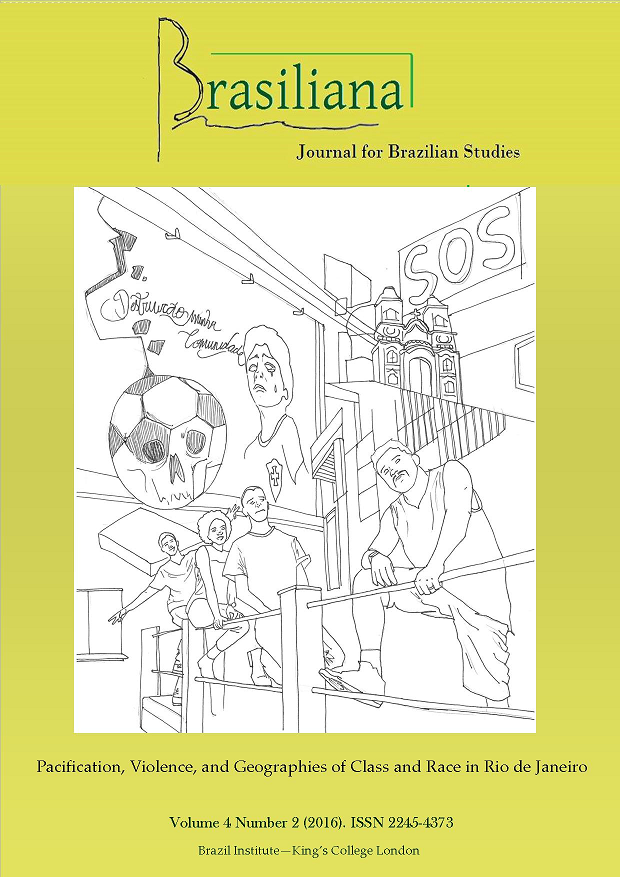Building up a convenient accountability: How the ‘anti-corruption’ law in Brazil was put into force
Main Article Content
Abstract
Article Details
![]()
Articles published in Brasiliana are licensed under a Creative Commons Attribution-NonCommercial-NoDerivs 3.0 Unported License.
When publishing open access, the author signs an author publishing agreement in which they retain copyright and give Brasiliana the right to publish the article. Our Open Access publications are distributed under the terms of the Creative Commons Attribution 4.0 International License, which permits unrestricted use, distribution, and reproduction in any medium, provided the original work is properly cited.
References
Beccaria, C. (1963), An Essay on Crimes and Punishments. Indianapolis: Bobbs-Merrill.
Becker, G. S. (1968), ‘Crime and Punishment: An Economic Approach’, The Journal of Political Economy, Vol. 76, No. 2. (Mar. - Apr., 1968), pp. 169-217.
Bottini, P. and Tamasauskas, I. (2014), ‘A interpretação constitucional possível da responsabilidade objetiva na Lei Anticorrupção’ in Revista dos Tribunais (São Paulo. Impresso), v. 974, p. 133, 2014.
Bovens, M. (2007), Analysing and assessing accountability: A conceptual framework. European Law Journal, 13(4): 447-468.
Contas Abertas. (2014), ‘Empresas da Lava Jato receberam R$ 11,4 bi do governo federal de 2004 a 2014 [Companies investigated by “Lava Jato” gained R$ 11,4 bi from the federal government from 2004 and 2014] at http://www.contasabertas.com.br/website/arquivos/10024. Accessed on the 6th of August 2014.
De Figueiredo, F.O. (2012), Big Fish Out of Water: The Unequal Fight Against Political Corruption in Brazil. MA Dissertation in Criminology and Criminal Justice/King’s College London.
_________. (2015), ‘Suit Up to Go to Jail: How the Multi-institutional Approach Against Corruption Can Work In Brazil’ in King’s College Political Science Dialogue magazine. Issue 11, spring 2015. Available on http://issuu.com/kcldialogue/docs/issue_11_online/1.
________. (2016), ‘Buiding Accountability Under Intense Pressure: Lessons from Brazil’s Anticorruption Legislation’ in Bingham Centre for the Rule of Law Global Rule of Law Exchange Papers. FORTHCOMING.
Falcão, M. (2010), ‘Lula envia ao Congresso projeto de lei que pune empresas que pratiquem atos de corrupção [Lula sends to Congress bill that punishes companies for corruption acts’ in Folha de S.Paulo http://www1.folha.uol.com.br/poder/2010/02/691308-lula-envia-ao-congresso-projeto-que-pune-empresas-que-pratiquem-atos-de-corrupcao.shtml. Accessed on the 4th of August 2014.
Koehler, M. (2014), The Foreign Corrupt Practices Act in a New Era. Cheltenham Glos
Edward Elgar Publishing Ltd.
Lei No. L12846 [Brazilian Clean Companies Act, Chapter 1, Art 1, Chapter 2, Art 5], de 1 de Agosto de 2013, DIARIO OFICIAL DA UNIAO [D.O.U] de 2.8.2013 (Braz.), available at http://www.planalto.gov .br/ccivil_03/_Ato2011- 014/2013/Lei/L12846.htm (English Translation).
Levine, Andrew M., Yannett, Bruce E., Gomes de Almeida, Renata Muzzi., Michaels, Steven S. and Frischtak, Ana L. (2013), ‘Brazil Enacts Long-Pending Anti-Corruption Legislation’ FCPA Update n Vol. 5, No. 1 http://www.debevoise.com/~/media/files/insights/publications/2013/08/fcpa%20update/files/view%20fcpa%20update/fileattachment/fcpa_update_aug2013_111213pdf.pdf
Magalhães, João Marcelo Rego (2013) Aspectos relevantes da lei anticorrupção empresarial brasileira (Lei nº 12.846/2013) [Relevant features from Brazilian corporate corruption law (Law 12.846/2013)] in Revista Controle – Doutrina e Artigos Volume XI - Nº 2 http://www.tcm.rj.gov.br/Noticias/11280/controle_cmpleta_2013_2.pdf#page=26.
Nascimento, M.D. (2014), Lei anticorrupção empresarial: aspectos críticos à Lei nº
18.846/2013. Belo Horizonte: Fórum, v. 13, 2014, p. 15.
Newton, I. (1999), The Principia: Mathematical Principles of Natural Philosophy, a new translation by I. Bernard Cohen and Anne Whitman. Berkeley: University of California Press.
Nobrega, A.C.V. (2014), ‘A Nova Lei de Responsabilização de Pessoas Jurídicas como Estrutura de Incentivos aos Agentes [The New Anticorruption Act as an Incentive To Agents]’ in Economic Analysis of Law Review EALR, V. 5, nº 1, p. 62-76, Jan-Jun, 2014.
O'Donnell, G. (1998), “Horizontal Accountability in New Democracies” in Journal of Democracy 9.3 (1998) 112-126.
_________. (1999), ‘Delegative Democracy’ in G. O'Donnell Counterpoints: Selected Essays on Authoritarianism and Democratization. Notre Dame, University of Notre Dame Press: 159-174.
_________. (2004), ‘Why the Rule of Law Matters’ in Journal of Democracy. Volume 15, Issue 4, pp-32-46.
Schedler, A. (1999), ‘Conceptualizing Accountability’ The Self-Restraining State: Power and Accountability in New Democracies. Ed. Andreas Schedler, Larry Diamond, and Marc F. Plattner. Boulder and London: Lynne Rienner Publishers, 1999. 13-28.
Senado. (2013), ‘Senado aprova punição a empresas por corrupção [Senate approves punishment against companies for corruption acts]’ in http://www12.senado.leg.br/noticias/materias/2013/07/04/senado-aprova-punicao-a-empresas-por-corrupcao Accessed on the 5th August 2015.
Siegel, L. (1992), Criminology. Saint Paul (Minnesota): West Publishing Company
Singer, A. (2013), ‘Brasil, junho de 2013: Classes e ideologias cruzadas [Brazil, June 2013: Classes and cross ideologies]’ in Novos Estudos CEBRAP, no.97. São Paulo, November 2013
Skar, R. L. (1999), ‘Democracy and Constitutionalism’ in The Self-Restraining State: Power and Accountability in New Democracies. Ed. Andreas Schedler, Larry Diamond, and Marc F. Plattner. Boulder and London: Lynne Rienner Publishers, 1999. 13-28.
The Economist. (2015), Brazilian waxing and waning. Jun 5th 2015. http://www.economist.com/blogs/graphicdetail/2015/03/economic-backgrounder Accessed on the 5th of August.
US Dep’t of Justice and US Securities and Exchange Comm’n, “A Resource Guide to the U.S. Foreign Corrupt Practices Act” (Nov. 2012) at 56-66, http://www.justice.gov/criminal/fraud/fcpa/guidance/. 7 See UK Min. of Justice, “The Bribery Act 2010: Guidance” (Mar. 2011) at 20.
Zaheer, S. (2014), ‘Brazil's Landmark Clean Companies Act: Comparison to the OECD Anti-Bribery Convention and Issues’ in Pacific McGeorge Global Business & Development Law Journal. March 1, 2014. Available at http://ssrn.com/abstract=2417155 orhttp://dx.doi.org/10.2139/ssrn.2417155.

